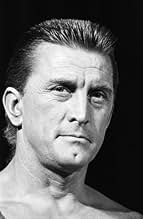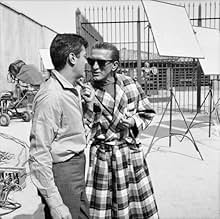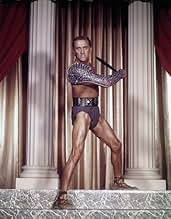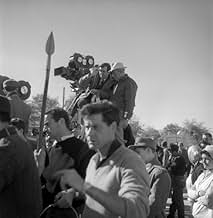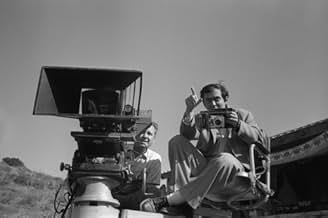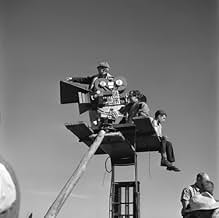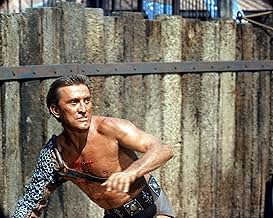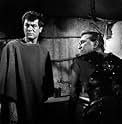Spartacus
- 1960
- Tous publics
- 3h 17min
L'esclave Spartacus mène la révolte violente contre la République Romaine décadente.L'esclave Spartacus mène la révolte violente contre la République Romaine décadente.L'esclave Spartacus mène la révolte violente contre la République Romaine décadente.
- Récompensé par 4 Oscars
- 12 victoires et 11 nominations au total
Nick Dennis
- Dionysius
- (as Nicholas Dennis)
Histoire
Le saviez-vous
- AnecdotesStanley Kubrick was brought in as director after Kirk Douglas had a major falling out with the original director, Anthony Mann. According to Sir Peter Ustinov, the salt mines sequence was the only footage shot by Mann.
- GaffesA map of Italy can be seen in Spartacus' camp tent (it is prominently featured in the scenes involving the pirate emissary), which is far too accurate for the times of the movie.
- Citations
Herald: I bring a message from your master, Marcus Licinius Crassus, Commander of Italy. By command of His Most Merciful Excellency, your lives are to be spared. Slaves you were and slaves you remain. But the terrible penalty of crucifixion has been set aside on the single condition that you identify the body or the living person of the slave called Spartacus.
Antoninus: [stands up] I'm Spartacus!
[everyone around Antoninus and Spartacus stands up and shouts "I'm Spartacus!"]
- Crédits fousThe six main cast members are accompanied by an item that represents their character (a chain, a Roman eagle, a wine jug, a couple of hands - one wielding a snake, and a sword).
- Versions alternativesAfter its premiere the film was heavily cut and wasn't shown in its complete form until 1991, when a restored version was re-released. Among the restored scenes is one where where Marcus Crassus (Laurence Olivier) tries to seduce Antonius (Tony Curtis) in the bath. The soundtrack was damaged, so Anthony Hopkins was called in to dub Olivier's lines. In addition, several scenes of violence preview audiences reacted to negatively were restored, including Crassus bloodily stabbing Draba, Marcellus being drowned in the stew, Spartacus stabbing a Roman soldier in the pool, and several gory shots in the final battle, notably Spartacus lopping off the arm of a Roman soldier.
- ConnexionsEdited into Hercule: Les Contemptibles (1997)
Commentaire à la une
It is very much part of Hollywood folklore that having dispensed with the services of Anthony Mann, producer and star Kirk Douglas brought in Stanley Kubrick with whom he had worked so effectively in 'Paths of Glory'. This represented a daunting challenge and Kubrick passed with flying colours. The rest as they say is history although Douglas always felt that Kubrick was not as grateful as he should have been!
It would be well-nigh impossible now to assemble a cast of such substance and quality. There were bound to be clashes of temperament of course and the animosity between Olivier and Laughton has been amusingly recounted by Peter Ustinov who picked up an Oscar as Best Supporting actor. Olivier here is in his physical prime and is magnificent in the role of Crassus. He is ruthlessness incarnate but tender in his scenes with the Lavinia of Jean Simmons. He had previously directed her in 'Hamlet' and their professional bond is palpable.
There are scenes which are indelibly etched notably the gladiatorial combat between Douglas and Woody Strode and the scene where the slave army watches the legions of Crassus forming for battle which must surely have been inspired by Eisenstein's 'Alexander Nevsky'. The score by Alex North although harsh captures perfectly the brutality of the times whilst Russell Metty's cinematography is outstanding.
Forget the others, this is the only gladiator film that really matters and it will never be surpassed.
It would be well-nigh impossible now to assemble a cast of such substance and quality. There were bound to be clashes of temperament of course and the animosity between Olivier and Laughton has been amusingly recounted by Peter Ustinov who picked up an Oscar as Best Supporting actor. Olivier here is in his physical prime and is magnificent in the role of Crassus. He is ruthlessness incarnate but tender in his scenes with the Lavinia of Jean Simmons. He had previously directed her in 'Hamlet' and their professional bond is palpable.
There are scenes which are indelibly etched notably the gladiatorial combat between Douglas and Woody Strode and the scene where the slave army watches the legions of Crassus forming for battle which must surely have been inspired by Eisenstein's 'Alexander Nevsky'. The score by Alex North although harsh captures perfectly the brutality of the times whilst Russell Metty's cinematography is outstanding.
Forget the others, this is the only gladiator film that really matters and it will never be surpassed.
- brogmiller
- 15 avr. 2020
- Permalien
Meilleurs choix
Connectez-vous pour évaluer et suivre la liste de favoris afin de recevoir des recommandations personnalisées
Détails
- Date de sortie
- Pays d’origine
- Site officiel
- Langue
- Aussi connu sous le nom de
- Espartaco
- Lieux de tournage
- Hearst Castle, San Simeon, Californie, États-Unis(Crassus' villa)
- Société de production
- Voir plus de crédits d'entreprise sur IMDbPro
Box-office
- Budget
- 12 000 000 $US (estimé)
- Montant brut aux États-Unis et au Canada
- 1 830 650 $US
- Week-end de sortie aux États-Unis et au Canada
- 92 162 $US
- 28 avr. 1991
- Montant brut mondial
- 1 846 975 $US
- Durée3 heures 17 minutes
- Couleur
Contribuer à cette page
Suggérer une modification ou ajouter du contenu manquant





